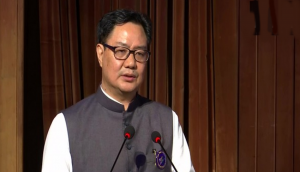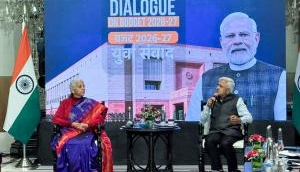
One of the most keenly awaited announcements in the union budget every year is related to personal taxation. In every budget income tax rates and slabs are reviewed. However, the income tax slabs have not been changed since 2014. Will Finance Minister Nirmala Sitharaman change the slabs and give relief to taxpayers in the budget on Tuesday?
The basic personal tax exemption limit was last revised in 2014. Presenting the first budget of Prime Minister Narendra Modi-led government in 2014 the then Finance Minister Arun Jaitley raised the basic income tax exemption limit from Rs 2 lakh to Rs 2.5 lakh. For senior citizens, the exemption limit was increased from Rs 2.5 lakh to Rs 3 lakh. The basic exemption limits have not been changed since then.
Nirmala Sitharaman is set to present her fourth union budget on February 1, 2022. Some analysts feel that the finance minister may announce major relief to taxpayers.
The expected relief include an increase in the basic exemption limit from Rs 2.5 lakh to Rs 3 lakh. For senior citizens, it is likely to be increased to Rs 3.5 lakh from the present Rs 3 lakh.
The top income slab is also likely to be revised upward from the existing Rs 15 lakh.
According to a pre-budget survey conducted among different stakeholders by KPMG recently, the majority (64 per cent) of respondents expect an enhancement in the basic income tax exemption limit of Rs 2.5 lakh.
"Our pre-budget survey indicates that relief for individual taxpayers by way of an enhancement in the basic income tax exemption limit of Rs 2.5 Lakh is highly awaited. Respondents also support an upward revision in the top income slab of Rs10 lakhs," said Rajeev Dimri, Partner and National Head of Tax, KPMG in India.
Although Sitharaman has not changed tax slabs and rates, she introduced a new tax regime in budget 2020. Under the new tax regime, the tax rates are reduced for those willing to forego tax exemptions and deductions.
The new tax regime remains optional for taxpayers. This means a taxpayer has the option to either stick to the old regime or choose the new one.
Currently, income upto Rs 2.5 is exempt from taxation under both regimes. Income between Rs 2.5 to Rs 5 lakh is taxed at the rate of 5 per cent under the old as well as the new tax regime.
Personal income from Rs 5 lakh to Rs 7.5 lakh is taxed at a rate of 20 per cent under the old regime, while under the new regime the tax rate stands at 10 per cent. Income between Rs 7.5 lakh to Rs 10 lakh is taxed at a rate of 20 per cent in the old regime, while in the new regime the tax rate stands at 15 per cent.
Under the old regime personal income above Rs 10 lakh is taxed at a rate of 30 per cent. However, under the new regime, there are three slabs above Rs 10 lakh. Personal income between Rs 10 lakh and Rs 12.5 lakh is taxed at a rate of 20 per cent under the new regime. Income from Rs 12.5 lakh to Rs 15 lakh is taxed at 25 per cent and income above Rs 15 lakh is taxed at a rate of 30 per cent.
The effective tax rate is much higher due to cess and surcharges.
An individual with a net taxable income of up to Rs 5 lakh is allowed to avail tax rebate of up to Rs 12,500 under Section 87A in both the old as well as the new tax system. So effectively, the tax liability of individuals with income up to Rs 5 lakh is zero under both the tax regimes.
The limit for deduction under Section 80C has also remained unchanged since 2014. In the 2014 budget, the 80C deduction limit was increased to Rs 1.5 lakh from Rs 1 lakh, while the deduction limits for interest on the home loan was increased to Rs 2 lakh from Rs 1.5 lakh.
Both these deductions remain unchanged since 2014. However, some additional deductions have been introduced in the subsequent budgets. In the 2015 budget, the government introduced an additional deduction of Rs 50,000 for contribution under the National Pension Scheme (NPS) under Section 80 CCD. The deduction limit on health insurance premiums was also increased from Rs 15,000 to Rs 25,000.
Major steps towards simplification and rationalisation of the income tax regime are also expected in this year's budget.
In the Budget 2020-21, around 70 exemptions and deductions of different nature were removed. The finance minister had announced that the "remaining exemptions and deductions will be reviewed and rationalised in the coming years with a view to further simplifying the tax system and lowering the tax rate."
In the 2021-22 Budget the finance minister did not make any significant change in the income tax rates or slabs.
"Although the Government has taken several measures to resolve tax disputes and overhaul the tax dispute resolution framework over the past few years, further measures in this regard may help in reducing litigation. Rationalisation of TDS and TCS provisions to ease compliance burdens will also be welcome," said Dimri.
(ANI)
Also Read: UP Polls: BJP not aware of my loyalty, Amit Shah knows I won't break down: RLD chief







![BJP's Kapil Mishra recreates Shankar Mahadevan’s ‘Breathless’ song to highlight Delhi pollution [WATCH] BJP's Kapil Mishra recreates Shankar Mahadevan’s ‘Breathless’ song to highlight Delhi pollution [WATCH]](https://images.catchnews.com/upload/2022/11/03/kapil-mishra_240884_300x172.png)

![Anupam Kher shares pictures of his toned body on 67th birthday [MUST SEE] Anupam Kher shares pictures of his toned body on 67th birthday [MUST SEE]](https://images.catchnews.com/upload/2022/03/07/Anupam_kher_231145_300x172.jpg)






